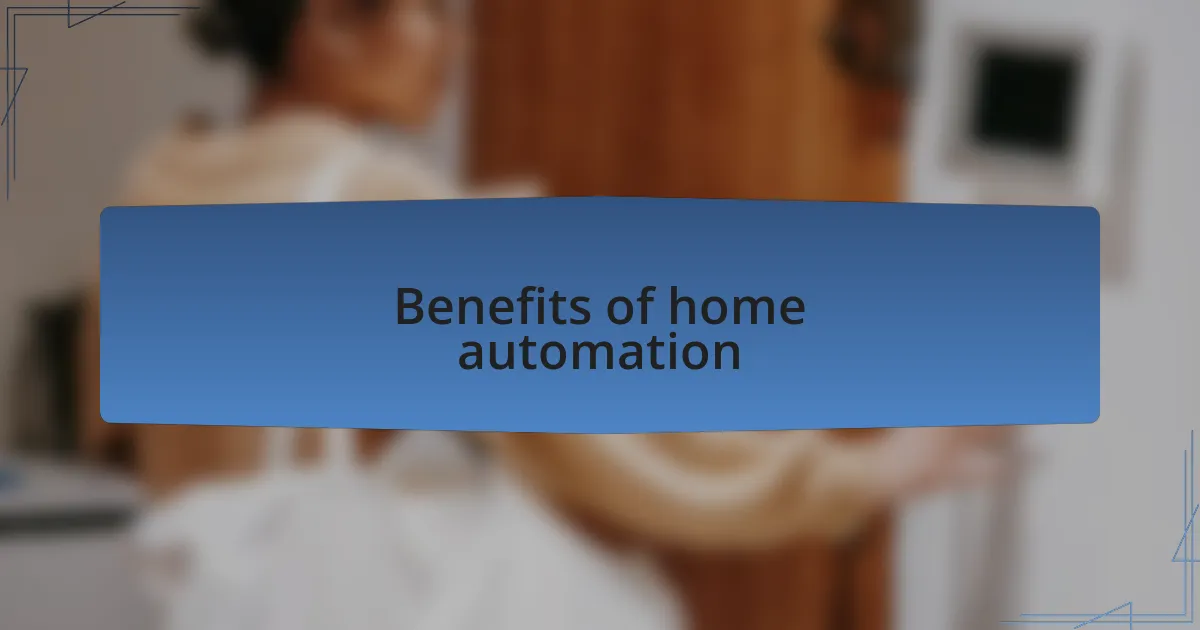Key takeaways:
- Home automation technology allows control of household devices via the internet, enhancing comfort, energy efficiency, and security.
- Benefits include energy savings, improved security through remote monitoring, and increased daily convenience.
- Choosing smart home brands should focus on compatibility, customer support, and regular software updates for a seamless experience.
- It’s essential to prioritize reliable brands and consider using devices from a single ecosystem to avoid compatibility issues.

What is home automation technology
Home automation technology refers to a system that enables the control of various household devices through the internet. It allows homeowners to manage everything from lighting and thermostats to security systems and appliances, often through a smartphone app or voice command. I still remember the first time I adjusted my home’s temperature while lounging on the couch; the convenience was astounding!
Imagine waking up and having your coffee brewed just in time for you to enjoy it while the lights gently brighten to mimic a sunrise. That’s the magic of this technology. It integrates seamlessly into daily life, creating an environment that responds to your preferences and routines.
By connecting various devices, home automation enhances comfort, energy efficiency, and security. Have you ever thought about how much time we spend mindlessly adjusting devices? Home automation not only simplifies this process but also offers peace of mind, knowing you can monitor and control your home from anywhere. This personal connection to technology elevates our living experiences in ways I never expected.

Benefits of home automation
One of the most significant benefits of home automation is energy efficiency. I remember my first month using automated lighting; the savings on my electric bill were a pleasant surprise. By programming lights and thermostats to operate only when needed, homeowners can dramatically reduce unnecessary energy consumption. Have you ever noticed how easy it is to forget to turn off the lights when rushing out?
Security is another compelling advantage of home automation. I felt an immediate sense of relief knowing I could monitor my home’s security cameras from my phone during a weekend getaway. With smart locks and alarm systems, it’s like having a virtual security guard. Isn’t it comforting to know that you can keep an eye on your home anytime, anywhere?
Lastly, the level of comfort that home automation provides is truly remarkable. For instance, when I first installed a smart speaker that controlled my entire system, it felt like I was living in the future. Just saying “good night” to my home prompts it to lock the doors and dim the lights. Doesn’t that sound like an effortless way to end the day? The joy and convenience of these little tweaks in daily life can make all the difference in how we experience our homes.

Popular smart home brands
When it comes to popular smart home brands, my experience has shown that Nest stands out for its intuitive design and seamless integration. I vividly recall setting up my Nest thermostat; it quickly learned my schedule and adjusted the temperature accordingly. Have you ever felt the satisfaction of coming home to a perfectly warmed house after a chilly day?
Another brand I’ve appreciated is Philips Hue. Their smart lighting system transformed my living space into a cozy haven for movie nights. With just a tap on my phone, I could create the perfect ambiance, and I found myself exploring the endless color possibilities. Who knew that changing the hue of a room could drastically shift the mood?
Lastly, I’ve also had good experiences with Ring, especially its video doorbell that provides a sense of security while I’m away. I remember the first time I got an alert while out running errands; seeing who was at my door in real time was both thrilling and comforting. Have you ever thought about how much peace of mind a smart doorbell can bring? It feels like bringing a little piece of home with you wherever you go.

Key features of smart brands
Smart brands are distinguished by their ability to integrate with various home systems, enhancing automation and convenience. I remember a time when I wanted to control my home’s lighting, thermostat, and security all from one central hub. Finding a brand that offered robust connectivity options made a significant difference in how smoothly my daily routines functioned. Has anyone else experienced the frustration of juggling multiple apps?
Moreover, user-friendly interfaces are a hallmark of effective smart brands. When I first explored my home automation setup, I was pleasantly surprised by how intuitive and easy it was to manage through a single app. It’s fascinating how a well-designed interface can make complex technology feel like second nature. Have you ever considered how much time you could save with simple navigation?
Lastly, the adaptability of a smart brand often defines its long-term viability. I once faced challenges when trying to expand my system as new devices became available. Discovering a brand that embraced compatibility was a game changer, allowing me to effortlessly incorporate new gadgets. Have you thought about how important it is for smart products to evolve with your lifestyle? It’s an essential feature to consider for a truly customized home automation experience.

My criteria for comparison
When evaluating different smart brands, my primary criterion revolves around compatibility with a variety of devices. I still recall the moment I installed a new smart lock only to find it wasn’t compatible with my existing ecosystem. That realization was frustrating and made me realize how crucial it is for a smart brand to work harmoniously with other products.
Another vital factor for me is the level of customer support a brand provides. I remember when I first set up my smart thermostat; I found myself needing assistance to navigate a few tricky settings. A responsive customer service team made all the difference, turning what could have been a headache into a smooth process. Have you ever had to troubleshoot a device without proper support? It’s not an enjoyable experience.
Finally, I look for brands that offer regular software updates. This feature assures me that my devices won’t become outdated or vulnerable to security threats. I once found myself caught off guard when an old hub lacked critical updates, leaving my home network exposed. How often do we consider the importance of keeping our devices secure and up to date? It’s a key aspect that shouldn’t be overlooked in our tech-driven lives.

My experiences with smart brands
When I think about my experiences with smart brands, one that stands out is Nest. The first time I used their smart thermostat, I was genuinely impressed by the learning capabilities it showcased. I vividly remember it adapting to my schedule. It felt like having a little helper in my home, making sure I was comfortable without me having to lift a finger. Have you ever felt that sense of relief when technology just works for you?
Another brand that made a significant impact on my home automation journey is Philips Hue. I still get excited thinking about how simple it was to create a cozy atmosphere with just a few taps on my phone. There’s something magical about dimming the lights or changing colors according to my mood— I mean, who wouldn’t want that? But what really struck me was how intuitive the app was; it didn’t require any deep technical know-how to customize my settings. Isn’t it incredible when tech seamlessly blends into our lives?
On the flip side, I’ve had less favorable experiences as well. I tried a lesser-known brand for smart security cameras, and honestly, it felt like I was taking a risk. The app often lagged, and the video quality wasn’t robust. I remember checking the feed multiple times just to ensure everything was okay, and the constant buffering made me anxious. How much trust can we place in brands that don’t deliver when it matters most? This experience taught me that not all brands live up to their promises, and reliability is paramount in home automation technology.

Recommendations based on my experience
One key recommendation I strongly advise is to prioritize brands with a proven track record of reliability. During my search for the best smart speakers, I encountered a highly-rated device that promised more features than I would ever need. However, after several days of struggling with connectivity issues, I quickly realized that the hype didn’t translate into real-world performance. Isn’t it frustrating when your expectations aren’t met? This taught me that sometimes sticking to established brands is worth the investment.
Another suggestion is to look for products that offer excellent customer support. I had a minor hiccup with my smart lock and reached out to customer service. I was amazed at how quickly my issue was resolved; it felt reassuring to know I had help just a phone call away. Have you ever felt lost trying to troubleshoot a gadget on your own? Trust me, having responsive support can transform a frustrating experience into a positive one.
Lastly, don’t shy away from investing in ecosystems that work seamlessly together. I learned this lesson when I tried to mix different brands of smart devices. It often led to compatibility issues that made my home automation less efficient than it could be. When I finally decided to consolidate my devices within a single ecosystem, the ease of use and synchronization was like night and day. Why complicate things when harmony can enhance your experience?